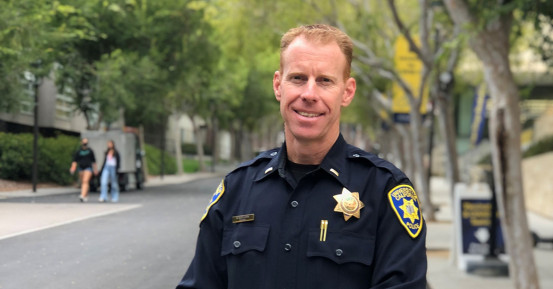By:
Published Date
Peace of Mind
Mental health resources evolve to support UC San Diego students
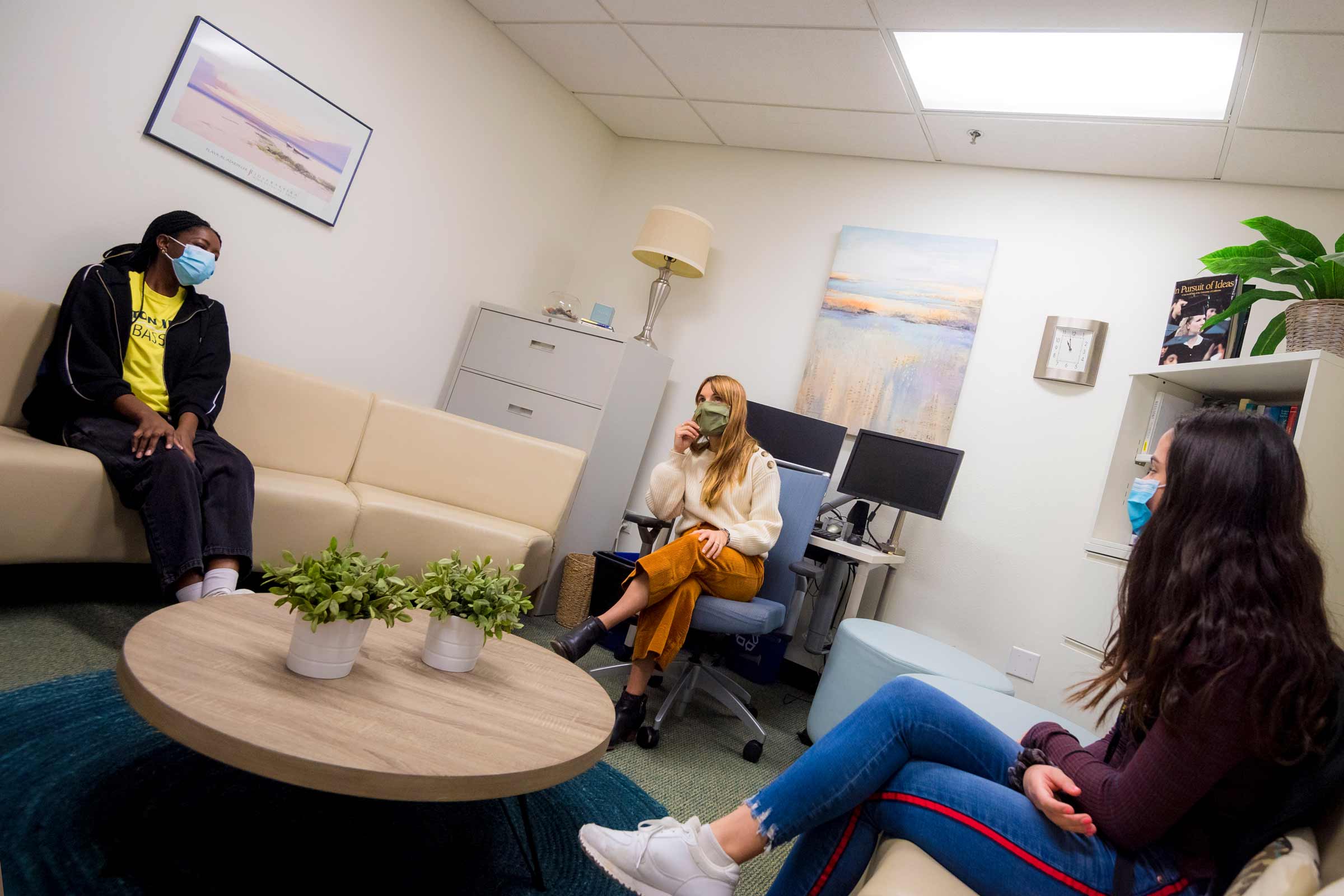
Students have access to a multitude of no-cost resources at UC San Diego to maintain wellness, including confidential counseling, self-guided tools, support groups, workshops and more. Photo by Erik Jepsen/University Communications.
Reina Juarez arrived at UC San Diego in August of 1988 to become the director of Counseling and Psychological Services (CAPS)—the first woman of color to be named a mental health director within the University of California system. Over the past three decades, she has grown CAPS from just 13 staff members to over 40 psychologists, licensed clinical social workers, psychiatrists and post-doctoral residents who serve more than 39,000 students.
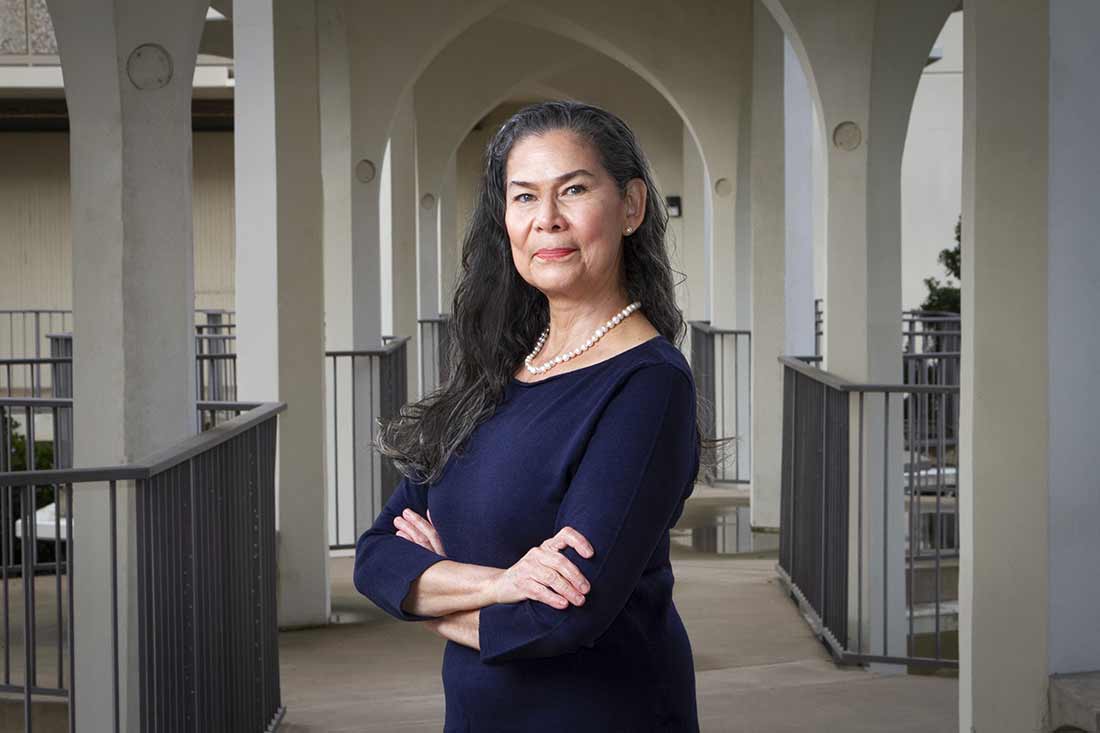
Reina Juarez, director of Counseling and Psychological Services, has grown her team from 13 staff members to over 40 in the past three decades to help students develop strong and sustainable mental health practices. Photo by Erika Johnson/University Communications.
In the last 34 years, Juarez has witnessed an increasing prevalence of anxiety, stress and depression among students who are juggling achieving academic ambitions and navigating the transition to adulthood—in addition to processing distressing national and global events. Fortunately, the stigma around seeking help is subsiding, and more students are reaching out to CAPS.
And they make connecting easy. CAPS staff are strategically positioned where students are, including each of the colleges, campus community centers, graduate student housing and Student Health Services in addition to their central office in Galbraith Hall. It’s all part of a larger Student Support and Success Initiative that provides holistic care for the mind and body as well as academic success and community building.
As we begin Mental Health Awareness Month this May, we sat down with Juarez to learn about how she and her team have helped students maintain peace of mind in a world that presents constant stressors.
Q. Like all of us, our students have been challenged by the ongoing pandemic and global issues. How are they doing?
A. One of the echoes of the pandemic is heightened mental health concerns, from more anxiety and depression to substance abuse and eating disorders. Just living in this volatile, unpredictable world we have to be constantly on our toes, adjusting and readjusting. The good thing is that our students are reaching out and they are open to using resources. We find that students are attending both in-person as well as virtual offerings, from connecting one-on-one with CAPS counselors through video visits, to attending interactive workshops and engaging with self-guided programs.
Q. What are the unique mental health needs of our graduate and professional students?
A. Similar to undergraduates, our graduate and professional students must navigate academic relationships with their faculty advisors and principal investigators. However, their journey presents unique needs because they are at a different stage in their life; for instance, some are married with a family and have more financial concerns. Their academic programs are longer as well, with motivation and confidence levels rising and falling over time. In addition, graduate and professional students may face isolation if their field is highly specialized. For all of these life circumstances, we are there to help.
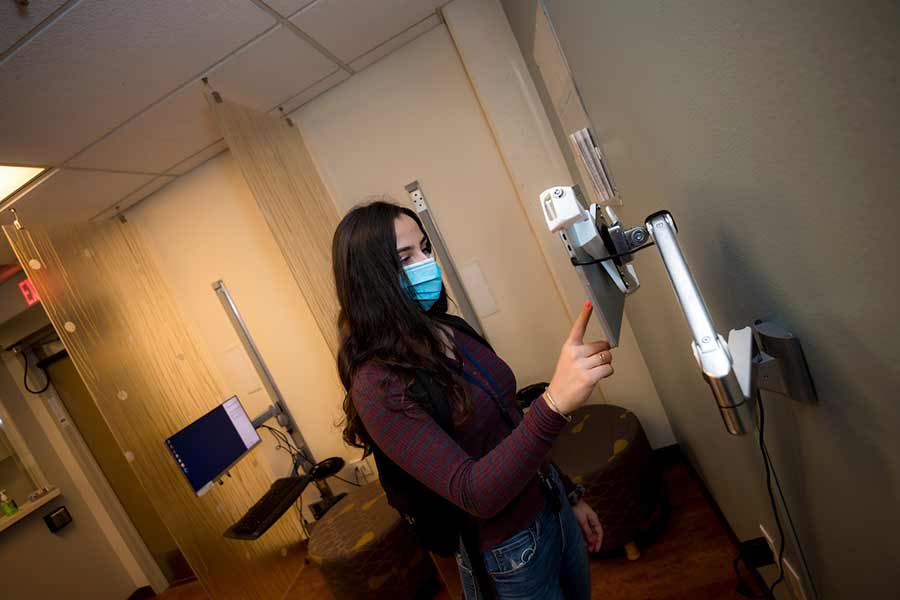
CAPS counseling services are available at no-cost to all registered students. Team members are available at the central office in Galbraith Hall as well as within each college and many of the campus community centers. Photo by Erik Jepsen/University Communications.
Q. Beyond providing individual counseling, how does CAPS connect with the university community through preventative education?
A. On nearly any day of the week, students can participate in a community forum, join a workshop or talk to a graduate and professional student well-being associate. One of our newest forums is the Trans and Gender Diverse Group, where students can explore their thoughts and feelings related to gender identity in a supportive, community-building environment. And we recently launched Tritons Rise, which are daily workshops that incorporate topics such as meditation, behavioral activation, academic success strategies and other foundations of well-being. In addition, CAPS has partnered with UC San Diego Athletics to support scholar-athletes and coaches with targeted training and therapy sessions.
Q. How does the growing CAPS team reflect the diversity of the campus population?
A. University campuses are enclaves of diverse communities, and it is important to have mental health providers that parallel our student population. We strive to have staff who know what students are experiencing based on their lived experiences, rather than relying on students to explain. Mental health providers can also serve as role models to our students; they can see people who look like them making a difference as healers and people that empower, mentor and advocate for them. We are delighted to have recently hired several new providers who focus on the Black and LGBT student experience.
Q. You’ve led CAPS for three decades, how has it evolved over time?
A. While I have seen an increase in the severity of mental health disorders among students, there has also been reduced stigma about seeking help. One reason students are more willing to reach out is the way we have transformed our care to be culturally responsive. In addition, we have experienced the advancement of electronic health records. CAPS moved under the umbrella of Student Health and Wellbeing and merged student health records with UC San Diego Health so that we can provide a continuum of care. This partnership allowed us to launch a telehealth platform in January 2020, a timely and impactful resource that enabled us to sustain services seamlessly as the pandemic spread.
Standing strong: students take the lead in cultivating wellness
College is a pivotal period for students, many of whom are away from home for the first time, managing the rigors of challenging courses and exploring their intersectional identities. This new generation is embracing mental health more than any other, realizing the significance of wellness on nearly every aspect of their lives.
A key voice and advocate for students is the Associate Vice President of Student Health and Well-being within Associated Students. UC San Diego seniors Katie Nugent and Isaac Lara are unshakable pillars of support for thousands of their peers, both having served in the role. They reflect on their own path to wellness and the evolving attitude toward mental health among college students.
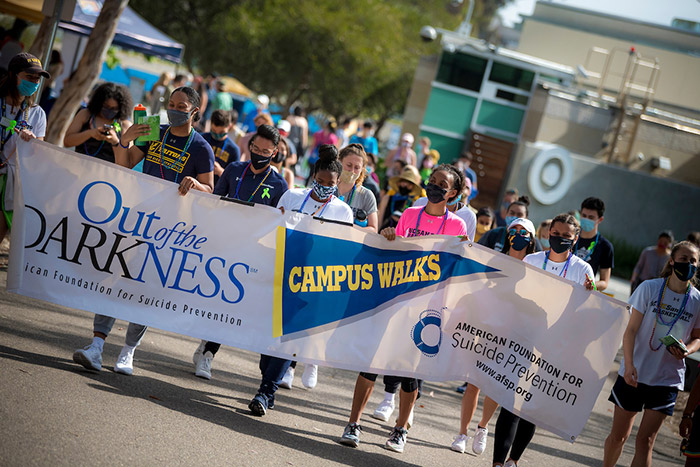
All are invited to take part in the Out of the Darkness Suicide Prevention Walk happening May 15, an event designed to engage young adults in the fight to prevent suicide. Photo by Erik Jepsen/University Communications.
Q. How have students embraced mental health and wellness?
Nugent: The pandemic brought mental health to the forefront, from the grief of losing loved ones to the loneliness that comes from isolation. Students are recognizing that mental health impacts everything from emotional, physical and social wellbeing to how to manage daily stressors. They are more aware that mental health can be a positive thing to tackle, and that going to therapy isn’t a bad thing.
Lara: As a campus community we’ve done really well to move toward a culture of acceptance toward mental health. But now we need to help our students overcome their own barriers to wellness, whether it’s cultural and familial upbringing or an internal belief that their issue is not worth addressing.
Q. Have you ever hesitated to reach out for help, and how did you overcome it?
Lara: I helped everyone else find resources because it was my job, but neglected my own care. It’s intimidating for a lot of students to pause and accept that there may be an issue. I’ve now learned to embrace my own struggle versus pretending or avoiding.
Nugent: I’m usually the person that is strong for others. When I was first diagnosed with an autoimmune disease at age 14, my doctor said I may experience some anxiety and depression. I completely rejected it. I was strong and didn’t need help–or the labels. When I got to college, I started to realize that there is nothing wrong with these labels. I opened up to friends more and found that they were experiencing similar struggles, too.
Q. What is the biggest lesson learned in your role as associate vice president of Student Health and Well-Being?
Lara: Growing up in a Mexican household where mental health topics were not addressed, I found myself drawn to psychology. I am enrolled in a clinical psychology and global health double major and was recently accepted into UC San Diego’s global health master’s program. One of the biggest lessons I’ve learned is to be yourself and don’t feel the need to normalize things that personally do not feel right.
Nugent: I am a human biology major and global health minor, so medicine has always been my passion, as well as equity, diversity and inclusion. Being a student health leader has allowed me to grow my advocacy skills, which helps prepare me for a role in health care policy and administration as well as becoming a physician assistant. I’ve also come to realize that physical health and mental health are closely connected, and both have to be nurtured, otherwise we break down.
Share This:
You May Also Like
Stay in the Know
Keep up with all the latest from UC San Diego. Subscribe to the newsletter today.
